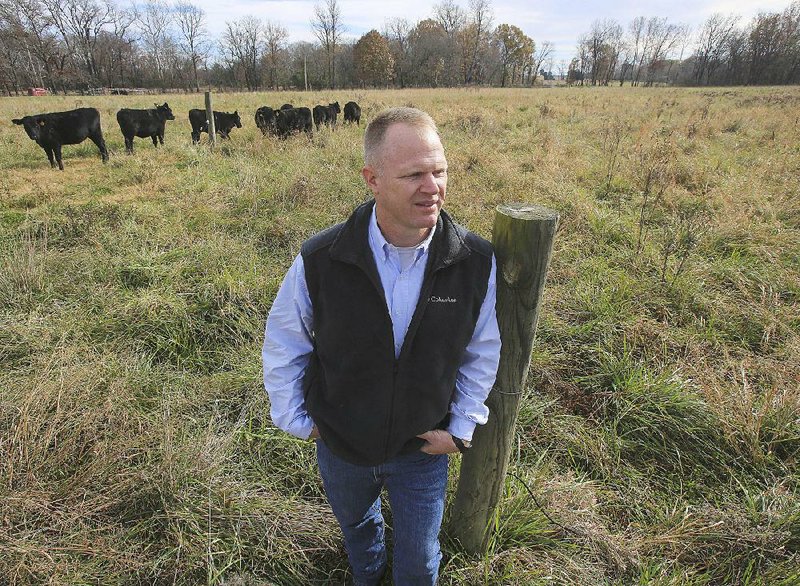STEPROCK -- Eight Black Angus cattle kept a wary watch on visitors to Ryan Pace's farm here while while munching on flourishing stands of fescue, clover and rye.
Standing nearby, Pace quietly explained the virtues of raising grass-fed beef. A couple of hawks circled overhead, as silent as the valley below.
Pace's other workplaces aren't quite so peaceful. When he leaves his farm in rural White County, he drives 50-odd miles to Little Rock to fly helicopters for Arkansas Children's Hospital and the Arkansas Army National Guard.
Pace said he enjoys the variety of flying and farming, but it's clear the farm is his refuge.
"I tell people my blood pressure drops about 30 points when I drop down the hill into the valley and onto the farm," he said.
Even though he's still active in the Guard, Pace is part of a military cohort that state and federal agriculture officials hope will help replenish the nation's aging farm workforce. The average American farmer is 58 years old, and the U.S. Department of Agriculture is encouraging retiring military service members to consider farming and ranching.
As part of that effort, information on USDA resources for new farmers and ranchers is included in the career training and counseling programs that are offered to service members as they leave the military. The information is expected to reach 200,000 retiring servicemen annually, according to the USDA.
Arkansas Agriculture Secretary Wes Ward, an officer in the U.S. Marine Corps Reserve, supports the initiative, noting that the demands on American agriculture will grow as the world's population approaches 10 billion by 2050.
"We've got to be able to produce more food with fewer resources than we've ever done before," Ward said. "It takes smart people who are highly trained, highly skilled, to be able to meet those demands."
Arkansas has about 250,000 veterans who have the discipline and the resourcefulness to succeed in agriculture, he said.
"Most people coming from the military don't want to sit in an office all day long," Ward said. "They want to be outside. They want to be doing something with their hands."
In July, Gov. Asa Hutchinson announced the state's "Arkansas Homegrown by Heroes" program, part of a national effort to help military veterans in agriculture market their products. Among other benefits, participants, including Pace's Wholly Cow Farms, are listed on www.arkansasgrown.org.
To take part in the Arkansas Homegrown by Heroes program, veterans must complete applications at the state website and at a site belonging to the national Farmer Veteran Coalition, www.farmvetco.org.
Pace, 43, always knew he wanted to raise livestock. Reared on a cattle farm in southern Missouri, he came to Arkansas to attend Harding University, where he met his wife and played on the football team as a freshman. He also joined the Army National Guard, a decision that eventually led to his deployment in Kuwait and Iraq as part of Operation Iraqi Freedom in 2004.
Though flying Black Hawk helicopters and raising cattle seem like very different occupations, Pace said there are fundamental similarities.
"In the military, you're taught to take care of what you have. You're taught to take care of your soldiers," he said. "It's really no different on the farm."
Pace takes pride in producing "grass-fed, grass-finished" cattle, rotating them through a series of paddocks that enables him to maintain healthy forage across his entire farm. He says he doesn't feed his animals antibiotics or growth hormones, preferring to "mimic nature" through free-range grazing.
The size of his herd varies but averages about 24 cattle, he said. To meet the demand for his product, Pace said, he buys cattle from a handful of ranchers who have agreed to raise their livestock according to his standards.
His beef is sold at the ranch or through select stores. More information is available at www.whollycowfarms.com.
When he started his operation near Steprock in White County, Pace got advice from his father. But he said he also leaned heavily on the University of Arkansas System Division of Agriculture's Cooperative Extension Service and the USDA's Natural Resources Conservation Service. Now he's advising younger veterans who are interested in taking up agriculture. It's hard work, he tells them, but well worth the effort.
When he's on the day shift at Children's Hospital, his own day can start as early as 4 a.m., he said, and not end until after he's attended one of his three children's ballgames that night.
Inevitably, problems arise while he's off flying -- a calf escapes a pasture, or the like -- and Pace has to rely on his children and neighbors to put matters right.
"It takes a community," Pace said. "Neighbors help each other. We depend on each other."
Business on 11/26/2015

